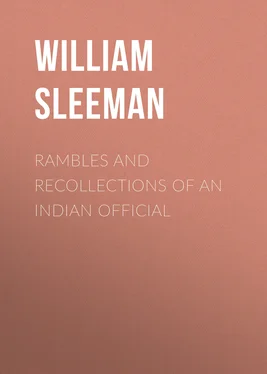William Sleeman - Rambles and Recollections of an Indian Official
Здесь есть возможность читать онлайн «William Sleeman - Rambles and Recollections of an Indian Official» — ознакомительный отрывок электронной книги совершенно бесплатно, а после прочтения отрывка купить полную версию. В некоторых случаях можно слушать аудио, скачать через торрент в формате fb2 и присутствует краткое содержание. Жанр: Путешествия и география, История, foreign_edu, foreign_antique, foreign_prose, на английском языке. Описание произведения, (предисловие) а так же отзывы посетителей доступны на портале библиотеки ЛибКат.
- Название:Rambles and Recollections of an Indian Official
- Автор:
- Жанр:
- Год:неизвестен
- ISBN:нет данных
- Рейтинг книги:4 / 5. Голосов: 1
-
Избранное:Добавить в избранное
- Отзывы:
-
Ваша оценка:
- 80
- 1
- 2
- 3
- 4
- 5
Rambles and Recollections of an Indian Official: краткое содержание, описание и аннотация
Предлагаем к чтению аннотацию, описание, краткое содержание или предисловие (зависит от того, что написал сам автор книги «Rambles and Recollections of an Indian Official»). Если вы не нашли необходимую информацию о книге — напишите в комментариях, мы постараемся отыскать её.
Rambles and Recollections of an Indian Official — читать онлайн ознакомительный отрывок
Ниже представлен текст книги, разбитый по страницам. Система сохранения места последней прочитанной страницы, позволяет с удобством читать онлайн бесплатно книгу «Rambles and Recollections of an Indian Official», без необходимости каждый раз заново искать на чём Вы остановились. Поставьте закладку, и сможете в любой момент перейти на страницу, на которой закончили чтение.
Интервал:
Закладка:
It is a question of very great importance, no less morally and politically than fiscally, which of these systems deserves most encouragement—that in which the Government considers the immediate cultivators to be the hereditary proprietors, and, through its own public officers, parcels out the lands among them, and adjusts the rates of rent demandable from every minute partition, as the lands become more and more subdivided by the Hindoo and Muhammadan law of inheritance; or that in which the Government considers him who holds the area of a whole village or estate collectively as the hereditary proprietor, and the immediate cultivators as his lease-tenants—leaving the rates of rent to be adjusted among the parties without the aid of public officers, or interposing only to enforce the fulfilment of their mutual contracts. In the latter of these two systems the land will supply more and better members to the middle and higher classes of the society, and create and preserve a better feeling between them and the peasantry, or immediate cultivators of the soil; and it will occasion the re- investment upon the soil, in works of ornament and utility, of a greater portion of the annual returns of rent and profit, and a less expenditure in the costs of litigation in our civil courts, and bribery to our public officers.
Those who advocate the other system, which makes the immediate cultivators the proprietors, will, for the most part, be found to reason upon false premisses—upon the assumption that the rates of rent demandable from the immediate cultivators of the soil were everywhere limited and established by immemorial usage, in a certain sum of money per acre, or a certain share of the crop produced from it ; and that 'these rates were not only so limited and fixed, but everywhere well known to the people ', and might, consequently, have become well known to the Government, and recorded in public registers. Now every practical man in India, who has had opportunities of becoming well acquainted with the matter, knows that the reverse is the case ; that the rate of rent demandable from these cultivators never was the same upon any two estates at the same time: nor even the same upon any one estate at different limes, or for any consecutive number of years . 134 134 This proposition no doubt was true for the 'Sāgar and Nerbudda Territories' in 1835, but it cannot be predicated of the thickly populated and settled districts in the Gangetic valley without considerable qualification. Examples of long-established, unchanged, well-known rent-rates are not uncommon.
The rates vary every year on every estate, according to the varying circumstances that influence them—such as greater or less exhaustion of the soil, greater or less facilities of irrigation, manure, transit to market, drainage—or from fortuitous advantages on one hand, or calamities of season on the other; or many other circumstances which affect the value of the land, and the abilities of the cultivators to pay. It is not so much the proprietors of the estate or the Government as the cultivators themselves who demand every year a readjustment of the rate demandable upon their different holdings. This readjustment must take place; and, if there is no landlord to effect it, Government must effect it through its own officers. Every holding becomes subdivided when the cultivating proprietor dies and leaves more than one child; and, as the whole face of the country is open and without hedges, the division is easily and speedily made. Thus the field-map which represents an estate one year will never represent it fairly five years after; in fact, we might almost as well attempt to map the waves of the ocean as field-map the face of any considerable area in any part of India. 135 135 In recent years this task of 'mapping the waves of the ocean' has been attempted. Every periodical settlement of the land revenue in Northern India since 1833 has been accompanied by the preparation of detailed village maps, showing each field, even the tiniest, a few yards square, with a separate number. In many cases these maps were roughly constructed under non-professional supervision, but in many districts they have been prepared by the cadastral branch of the Survey Department. The difficulty mentioned by the author has been severely felt, and it constantly happens that beautiful maps become useless in four or five years. Efforts are made to insert annual corrections in copies of the maps through the agency of the village accountants, and the 'kānūngos', or officers who supervise them, but the task is an enormous one, and only partial success is attained. In addition to the maps, records of great bulk are annually prepared which give the most minute details about every holding and each field.
If there be any truth in my conclusions, our Government has acted unwisely in going, as it has generally done, into [one or other of] the two extremes, in its settlement of the land revenue.
In the Zamīndārī settlement of Bengal, it conferred the hereditary right of property over areas larger than English counties on individuals, and left the immediate cultivators mere tenants-at-will. 136 136 The Permanent Settlement of Bengal, effected under the orders of Lord Cornwallis in 1793, was soon afterwards extended to the province of Benares, now included in the United Provinces of Agra and Oudh. Illusory provisions were made to protect the rights of tenants, but nothing at all effectual was done till the passing of Act x of 1859, which has been largely modified by later legislation.
These individuals felt no interest in promoting the comfort and welfare of the village communities, or conciliating the affections of the cultivators, whom they never saw or wished to see; and they let out the village, or other subdivision of their estates, to second parties quite as little interested, who again let them out to others, so that the system of rack-renting went on over the whole area of the immense possession. This was a system 'more honoured in the breach than in the observance'; for, as the great landholders became involved in the ruin of their cultivators, their estates were sold for arrears of revenue due to Government, and thus the proprietary right of one individual has become divided among many, who will have the feelings which the larger holders wanted, and so remedy the evil. In the other extreme, Government has constituted the immediate cultivators the proprietors; thereby preventing any one who is supported upon the rent of land, or the profits of agricultural stock, from rising above the grade of a peasant, and so depriving society of one of its best and most essential elements. The remedy of both is in village settlements, in which the estate shall be of moderate size, and the hereditary property of the holder, descending on the principle of a principality, by the right of primogeniture, unaffected by the common law. This is the system which has been adopted in the Nerbudda territory, and which, I trust, will be always adhered to.
When we enter upon the government of any new territorial acquisition in India, we do not require or pretend to change the civil laws of the people; because their civil laws and their religion are in reality one and the same, and are contained in one and the same code, as certainly among the Hindoos, the Muhammadans, and the Parsees, as they were among the Israelites. By these codes, and the established usages everywhere well understood by the people, are their rights and duties in marriage, inheritance, succession, caste, contract, and all the other civil relations of life, ascertained; and when we displace another Government we do not pretend to alter such rights and duties in relation to each other, we merely change the machinery and mode of procedure by which these rights are secured and these duties enforced. 137 137 The general principle here stated of respect for personal substantive law in civil matters is still the guide of the Indian Legislature, but the accumulation of Privy Council and High Court rulings, combined with the action of codes, has effected considerable gradual change. Direct legislation has anglicized the law of contract, and has modified, though not so largely, the law of marriage, inheritance, and succession.
Интервал:
Закладка:
Похожие книги на «Rambles and Recollections of an Indian Official»
Представляем Вашему вниманию похожие книги на «Rambles and Recollections of an Indian Official» списком для выбора. Мы отобрали схожую по названию и смыслу литературу в надежде предоставить читателям больше вариантов отыскать новые, интересные, ещё непрочитанные произведения.
Обсуждение, отзывы о книге «Rambles and Recollections of an Indian Official» и просто собственные мнения читателей. Оставьте ваши комментарии, напишите, что Вы думаете о произведении, его смысле или главных героях. Укажите что конкретно понравилось, а что нет, и почему Вы так считаете.












